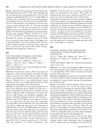Search
for
Sort by
Research
30 / 1000+ resultsresearch Two Cases of Reversible Bilateral Painful Gynecomastia Induced by 1mg Oral Finasteride (Propecia)

research Male Androgenetic Alopecia Treated With Finasteride
Finasteride 1mg daily effectively increases hair growth and slows hair loss in men with male pattern baldness over two years.

research Impact of 6-Month Course of 1 mg Finasteride Tablets on Lipid Profile Levels in Men with Androgenic Alopecia
Taking 1mg finasteride tablets for 6 months can lower good cholesterol (HDL) and raise triglycerides in men with hair loss.

research Faculty Opinions Recommendation of Effect of 1 mg/Day Finasteride on Concentrations of Serum Prostate-Specific Antigen in Men With Androgenic Alopecia: A Randomised Controlled Trial
Taking 1mg of finasteride daily for hair loss can lower PSA levels by 40-50%, so to keep PSA effective as a cancer screening tool, the PSA value should be doubled during treatment.

research Post Finasteride Syndrome: Demographics from FDA Database
Younger people (median age 35) experience more PFS-like symptoms with 1mg finasteride; more research needed.

research Finasteride Drug Safety Alert
Finasteride may cause depression, suicidal thoughts, and sexual side effects.

research Financing Finasteride: Identifying Resources to Improve Access
GoodRx.com helps find the cheapest options for finasteride, a medication not often covered by insurance.

research The Relative Effect of Monotherapy with 5-Alpha Reductase Inhibitors and Minoxidil for Female Pattern Hair Loss: A Network Meta-Analysis Study
Finasteride 5mg daily is the most effective for female pattern hair loss, with higher doses of treatments generally more effective.

research A Review of Hormonal Therapy for Female Pattern (Androgenic) Alopecia
Hormonal therapy like cyproterone acetate and spironolactone may help female hair loss, but more research is needed, especially for pre-menopausal women.

research Finasteride
Man experienced lasting sexual issues and stress from finasteride, accused doctor of malpractice.

research Viable Terminal Scalp Hair Follicles Are Necessary and Sufficient for Clinical Efficacy of Finasteride in Male Pattern Hair Loss
Finasteride works for hair loss by maintaining existing hair follicles, not reversing miniaturization.

research Spermatozoa and Chronic Treatment with Finasteride: A TEM and FISH Study
Finasteride may negatively affect male fertility.

research Post-Finasteride Syndrome: Risks and Side Effects of Finasteride for Androgenetic Alopecia
Finasteride may cause lasting sexual, mental, and physical symptoms; use with caution.

research Post-Finasteride Syndrome: When Will We Get the Courage to Fight the Dictating Pharma Industry Despite Awareness of Sexual, Neurological, and Metabolic Side Effects in Young Men for Over a Decade
Finasteride, a drug used for certain conditions, can cause serious side effects like sexual dysfunction, suicidal thoughts, and increased diabetes risk, and there's a need for more awareness and research about these effects.

research Finasteride
Finasteride treats enlarged prostate, shrinks it, improves urination, but may cause sexual dysfunction and isn't for women or children.

research Finasteride, a Type 2 5α-Reductase Inhibitor, in the Treatment of Men with Androgenetic Alopecia
Finasteride effectively treats male hair loss, improving growth and density.

research Anti-Androgenic Therapy with Finasteride Improves Cardiac Function, Attenuates Remodeling, and Reverts Pathologic Gene Expression After Myocardial Infarction in Mice
Finasteride improves heart function and repairs damage after heart attack in mice.

research Drug Treatment for Androgenetic Alopecia: First Italian Questionnaire Survey on Dermatologists' Opinions about Finasteride
Finasteride is considered the best treatment for hair loss, despite side effects.

research Post-Finasteride Syndrome: Outcomes of FDA Database

research A Clinical Study of the Effects of Finasteride on Androgenetic Alopecia
Finasteride effectively treats hair loss in men with minimal side effects.

research A Review of the FAERS Data on 5-Alpha Reductase Inhibitors: Implications for Postfinasteride Syndrome
The review suggests younger men taking 1 mg finasteride report more side effects, including sexual, skin, metabolic, and psychological issues.

research Efficacy of Non-Surgical Treatments for Androgenetic Alopecia in Men and Women: A Systematic Review with Network Meta-Analyses and an Assessment of Evidence Quality
Minoxidil and finasteride work best for hair loss; more research needed.

research Persistent Sexual Dysfunction and Depression in Finasteride Users for Male Pattern Hair Loss: A Serious Concern or Red Herring?
Finasteride, a hair loss drug, may cause sexual dysfunction and depression, but these effects are usually temporary and the drug is generally safe. More research is needed.

research Controlled Clinical Trial for Evaluation of Hair Growth with Low Dose Cyclical Nutrition Therapy in Men and Women Without the Use of Finasteride
Low dose cyclical nutrition therapy can consistently and safely improve hair growth and density without needing anti-androgens.

research The Effectiveness of Combination Therapies for Androgenetic Alopecia: A Systematic Review and Meta-Analysis
Combination therapies work better than single treatments for hair loss.

research Effects of 5-Alpha Reductase Inhibitors
5-alpha reductase inhibitors can cause sexual, neurologic, endocrine, and cardiovascular side effects, but these are rare and usually stop after ending treatment.

research A Scoping Review of Pharmacotherapy, Complementary, and Alternative Medicine, and Surgical Therapies for Androgenic Alopecia
Various treatments help hair growth, but more research needed for safety and effectiveness.

research Androgenetic Alopecia: Therapy Update
There are many treatments for common hair loss, but more trials are needed to decide which are best.

research Combination and Rotational Therapy in Androgenetic Alopecia
Using different hair loss treatments at various times can improve results and reduce side effects for people with chronic hair loss.